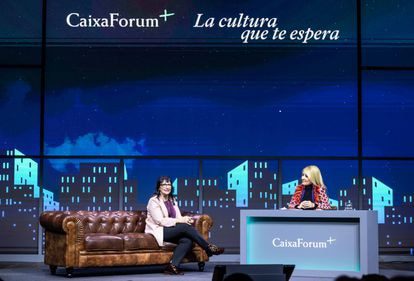with the release of Caixa+ ForumLa Caixa Foundation, a new free digital platform, aims to bring culture and scholarly publishing closer together through the Internet, as these contents are gaining more followers every day. Thanks to Very similar interface to that of Netflix and Disney+—at the top of the page, stars are created alone, while the rest of the catalog appears, sorted by sections, below—the app initially offers 334 titles and more than 500 hours of its own content and collaborations with other entities, with durations ranging from two minutes to 10 consecutive hours. Audiovisual presentation divided into nine categories: Visual and plastic arts, performing arts, music, literature, thought, history, cinema, architecture, design, life sciences, and physical sciences.
“We want to be complementary to cinema platforms,” Elisa Duran, Deputy General Manager of La Caixa Foundation, explained on Tuesday at the presentation ceremony held at the CaixaForum in Madrid. To achieve this goal, they present documentaries and concerts, Podcastand interviews and performances accompanied by films, fictional series and other productions that focus on what is behind the scenes. Actress and host of the ceremony, Cayetana Guillén Cuervo, commented, “It is useful to get to know cinema from the inside so that it is understood and not prejudged.” Director Leticia Dolera joined in this view, adding that it was the only way to create a critical audience.

Digital platforms have gone strong in recent years, in part due to the pandemic, at the expense of face-to-face shows, such as concerts or cinema, that have lost their viewers –A quarter of those who went to cinemas in the year before the virus did so in 2021, according to a survey of cultural habits from the Ministry of Culture and Sports.-. The idea for CaixaForum + was born in 2019, according to Doran, with the aim of “responding to new consumer needs” that exist in the digital world: being able to see the latest fashion series to a room in your museum with one click.
So far, organizations have used the power of social networks to reach out to internet users –Museo del Prado has live performances on Instagram and TikTok, with its insiders explaining the curiosity– because they did not have the resources to operate this mechanism. In the case of Thyssen, its technical director, Guillermo Solana, explained that this platform was the solution to its digitization: “We wanted to launch PlayThyssen, but we cannot alone.” In the past year, many museums have had to close rooms due to staff shortages. CaixaForum + assumes itself as a complex of cultural institutions with the participation of 90 entities.

For Solana, in front of A quantum leap prompted by the platformsThis project makes culture in all its aspects compete “in its own environment”. But the intent is not to change face to face to Online, but to “build loyalty into cultural consumption in institutions,” Doran asserted, perching on a sofa that guests were walking through as if it were a late-night talk show. Technical Director of Grand Theatre, LiceuVíctor García de Gomar celebrated the potential La Caixa platform offers to open up its content to off-centre viewers. A double-edged sword that Dolera focused on: “This content can’t be exclusive, we have to create fans who want to go in person to see the culture.”
Culture isn’t the only thing the public can find on CaixaForum+; Scientific publishing is the other pillar supporting the project. “It is a way to remove the barrier that exists between literature and science. We have just listened to a beautiful song and now we are going to present a paper on science,” stated the physicist Bartolome Luque after the performance of the singer Maria Arnal.
The contents do not just focus on bringing the museum activity into the digital world: an unprecedented catalog has been created to accompany the range of face-to-face activities. Among the first initiatives already available, Dolera, accompanied by a commissioner from GuggenheimIt reviews the political and social context of three paintings. in the chain From urban to ruralWriters Maria Sanchez and Miqui Otero reveal the places in Spain that have been the setting for literary stories. All products have famous names such as Fernando Trueba, Blanca Portillo, Antonio Muñoz Molina, Julio Manrique, Soledad Sevilla or Emilio Morinati.
All the culture that goes with you is waiting for you here.
papilla
Literary novelties analyzed by our best critics in our weekly newsletter

“Travel junkie. Coffee lover. Incurable social media evangelist. Zombie maven.”
